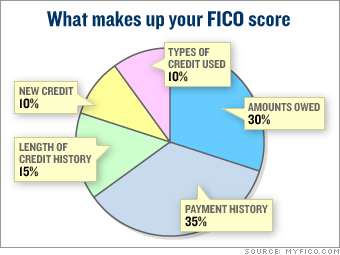The bigger your total balance as a percent of your total credit limit across all your credit cards, the lower your score will be.
Rex Johnson, founder of credit union consulting firm Lending Solutions Consulting, has spent years studying FICO credit scores - the most widely used among lenders. Scores range from 300 to 850 - the higher the better, with anything above 760 being the most desirable.
Johnson estimates that you lose 1 point for every percent of your credit limit that you use. So if you have a total credit limit of $10,000 and have an outstanding balance of $4,000 (40%), your score would be 40 points lower than if you had a $0 balance.
Ideally, credit experts say, your never want your balance to exceed 30 percent of your credit limit.
It's always good to pay off your balances every month. But creditors may take a few weeks or even a couple of months to report your payment to the credit bureaus.
To boost your score: Don't charge anything for at least 60 days before applying for a loan, Johnson said. That way it's likely that all the payments you've made to date will be reflected in your credit score by the time a lender requests it.
If you can't pay off your total balance in full, at least keep it under 30 percent of your total credit limit.
| Saving and spending aren't the only factors affecting your net worth. How you manage (or don't manage) your assets and liabilities can make a big difference, too. (more) You don't have to spend a lot of time to put your financial house in order. (more) |

